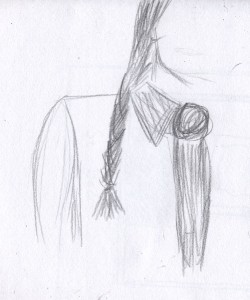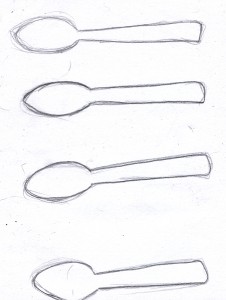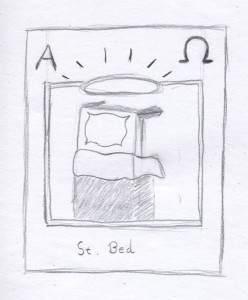(Trigger warnings: this post includes explicit talk about sexual activity, genitals, and a brief mention of a threat of violence.)
This post is part of Queer Theology’s Queer Synchroblog 2013.
The Initiation
The initiation was supposed to happen May of 2014. It is then that I’ll turn forty.
There’s many more positive messages available these days about women over forty than there used to be. But when I was coming up, forty was the most hotly contested age for a woman. When I was a very young kid, a woman’s life was supposed to be over at 40. At 10 I watched my mother find her fortieth birthday humiliating. That elusive “real womanhood†was revoked from anyone who had it once they turned forty. I have an imprint of that information somewhere deep in me, along with a ghost of a counter-image: some commercials for hair dye and the like with that capitalist co-opting of “empowermentâ€: your life doesn’t have to be over/don’t grow old gracefully/buy our shit and maybe you’ll still be a woman. During my teenage years and my twenties, though, I began exploring feminism, and I began finding communities of non-heteronormative sexualities. And there I found a flip side with substance to it: women that had begun embracing themselves at forty and older. They were fortysomething when they came out. They were fortysomething when they started the career they really wanted. The other side of the big 4-0 coin I saw was a lot of women coming into their own at forty, and that I found far more alluring as a milestone. As hard as I’ve worked to find myself and build myself, I expected that finally being forty would mean I’d made it — I’d survived intact, and I’d learned. I imagined I could look back and see that I had been created – and had then created my self – in wonderful ways. And I’d be that much more me, that much more comfortable, that much happier in my own skin.
So as my fortieth birthday came over the far horizon – about a year and a half before its arrival – I began planning. I knew I wanted a meaningful celebration. For me, that means no huge party. Instead, I wanted a new tattoo. I wanted a trip with my chosen family. And I wanted… to do something terrifying. To face a fear on my terms. The first real candidate I found for the leap of terror was jumping out of an airplane for the first time. I dreamt, and I waited.
That was the plan. The initiation was supposed to happen next year.
What I didn’t plan was the pain. The pain started in the first couple of days of May in 2013.
Embodiment
I’m very grateful now for every scrap of radical thought that has passed across my psychic desk. I’m grateful for the current self of mine that each of those moments – these brushes with grace – has created and is creating.
I’m grateful for the anti-capitalism that has seeped into me. For so many years, productivity and work were driven into me as vital values — ‘value’ in the monetary sense, not in the moral sense. Much of my Christian walk has reinforced that valuing of action and activism, doing and getting done, productivity for and usefulness to an employer who was now God. But there was a voice long ago that began with small questions and got louder and louder. And now I have, more than once in my life, valued my precious self separate and apart from my paycheck and my job performance.
I am grateful for every moment I’ve spent soaking up a deeply-rooted body positivity. I’m grateful for a valuing of flesh that goes beyond valuing pleasure (though pleasure is important), and that avoids the pitfall of universalizing some “common†human experience of embodiment. I am thankful for all the lessons I’ve received in a body positivity that values difference, values specificity, values real individuals with real uniqueness. I’m grateful for every time I’ve practiced a mindful approach to physical activity, for every moment that I’ve spent over the years valuing where I am specifically, right now, and what I can do today as something sacred… every one of those moments is saving my life right now.
I’m grateful for body theology, for every time I’ve considered the fact that this body is me, for every moment I’ve known that life as this flesh is my primary text for knowing God, my living document of divine love. Every experience I have of this world is from this body, as this body. Every relationship I have is rooted in this body. I’m not sure I would have the audacity to insist on valuing this pained flesh, insist on valuing my changing needs were it not for every moment spent practicing this knowledge.

A Summer of Swelling
One of the first teasing explanations we made for the growing ache was that my cock was having growing pains.
I was designated female at birth, and I never questioned that identity directly, until the last couple of years. This summer I’ve explored aspects of my genderqueerness – of my transgender self – in ways I never have before. I’ve opened up to my partner and myself simultaneously, and I have been amazed by what I’ve found. So, even though I haven’t explored any ways to change my physical self, a strange new passing genital pain seemed oddly reasonable at first.
After a few days I was back to “normalâ€, back to my well-known-to-me queer body. (If we use ‘queer’ as a verb, how well can we know a queer body? Is queer flesh so constantly defying definition that we are unknowable even to our queer selves… are we the Ultimate Mystery? I wonder sometimes.)
But the pattern continued. The pain came, and went, and came again, for longer and longer periods. The pain is primarily in my clitoris, and I am learning new levels of continuous pain I didn’t know existed. Our best guess through the weeks of May… and then one by one through the weeks of June… is a strangely behaving, recurring yeast infection.
July comes, and this queer body has been in bed a lot. A lot of work has been missed. Sometimes it seems my genitals may still bud a new penis — maybe I get to have one? I’ve always wondered what a penis feels like from the inside — for the tremendous swelling and redness going on between my legs. I often couldn’t walk without pain, or lay on my side. I am kinky, and I have experience with consensual pain. I can’t decide whether this makes the nonconsensual pain easier or more difficult. No pain is easy, but I feel layers of societal shit in this specific, sharp, clitoral pain: fears of rape, threats of rape, threats of losing bodily and sexual autonomy, the realities of me losing bodily and sexual autonomy. I do not consent to this pain.
I meet with a specialist and get a biopsy done of my labia. Recovering from having a chunk cut out of my vulva doesn’t feel much different than the last few weeks have.
July 12 I get a diagnosis. The term is lichen sclerosis, and it’s a rare autoimmune disorder. Pain and itching are common. The skin of the genitals gets inflamed, white and patchy, thin and easily cracked and torn. Scar tissue can develop. Scar tissue can close my vagina or cover over my clitoris. Some of this is worst case. Some of this happens when it’s not treated. We don’t know how mine will develop. Stories online include terrible years of problems, or few problems at all. Doctors say many folks respond well to treatment. Many folks use the internet to vent. It’s frightening. I don’t know what happens next.

Faith and Spoons*
Can I still follow Jesus flat on my back, unable to move much?
Am I still a theologian when pain prevents me from thinking clearly?
Does being a good Christian mean always striving to follow well? What if I don’t have the spoons to strive?
What does living my faith look like when my biggest need is rest?
Years of Christian fellowship – and a Master of Divinity degree – leave me wholly unprepared for these questions.
Time and Pain
I’m writing this on September 12, the two month anniversary of my diagnosis. I stayed home from work today and likely will tomorrow. I’m becoming certain that I’m disappointing my coworker and boss, but my partner has made it clear that taking care of me is my first priority. There has been terrible pain pretty constantly for two weeks; I powered through a lot of it, still going to work, and it’s eased up some now. But I’m more exhausted than I knew I could be.
Faith and Healing
Much of my years spent as a hospital chaplain were spent exploring questions about God and healing — about God’s power and suffering, and how those two things interact. I never did figure out why someone would worship an omnipotent God. It’s never appealed to me. If a God could stop suffering, but doesn’t… I just don’t want to know them, much less worship them. That’s just me. I mostly kept that to myself.
Queer Flesh
I’ve long resonated with multiple definitions of the word “queerâ€: as an umbrella term that encompassed both my bisexuality and the long-unnamed elements of my gender identity; as synonymous with being anti-assimilationist in a heteronormative society; and as a verb that means turning things on their head. Both the Hebrew and Christian scriptures have a fair amount of upside-down-edness, from the underdogs that the God of the Hebrew texts often champions, to the bizarre new kind of upside-down lordship and kingdom Jesus describes. I see all my scriptures as attempts to upend the status quo, uproot settled power structures, and to center those of our community members with the least power as full human beings and sacred human bodies with voices and power and beauty. I understand from my scriptures that justice and peace stem from valuing human bodies as sacred. In the Christian stories, God so loved human flesh that God couldn’t stop Godself from becoming some flesh.
The Disabled God
Nancy Eiesland changed my life when I read her book, The Disabled God: Toward a Liberatory Theology of Disability. Her response to the deeply-embedded ableism of Christianity is to make us all aware that a resurrected Christ is a disabled Christ, with impaired hands, feet, and side. His is not the perfect vision that we often define as “healthâ€. His divine body is not an unblemished body. Christ the resurrected and disabled God responds directly to many of our stereotypes of people with disabilities. He is not to be pitied. He is not a picture of noble suffering. He is not romanticized as a stoic, heroic overcomer of obstacles. Jesus Christ the disabled God bears dignity, survivorhood and interdependence into the Godhead. This sacred interdependence blesses each of us when we need help from others. The disabled God is a God who “celebrates joy and experiences pain not separate in time and space, but simultaneously.â€** This blesses a critical part of my own current existence, my own current body. God Godself finds wholeness and hope with disability. To paraphrase and embrace an insight from Eiesland, the existence of a disabled God makes it possible for me and for others to bear nonconventional bodies. This insight echoes into creating queer lives as well.

Privilege and Intersectionality
I’ve had privilege. I’ve had cis privilege. My gender nonconformity has not yet exposed me to physical violence. While it has shaped job choices, it has not generally closed doors I was interested in opening. I didn’t feel entirely dead inside whenever I’ve been named female. I feel partly seen… though I still mourn and have always mourned all the ways my father never saw me as a boy.
I’ve got privilege to still assume I won’t always have this trouble getting to work, getting around a store, getting out of bed. It’s possible I won’t have mobility issues for the rest of my life. When the pain hits, I do often forget this privilege. But assumptions that come with being able-bodied still float to the surface every few days: the pain should be gone by now. I shouldn’t have to make these accommodations anymore. How much longer will this phase last? I float between various self-definitions of being disabled, being chronically ill, being temporarily out of commission, getting a health issue “under controlâ€. I wonder if it’s okay or not to call myself disabled. I look up definitions of chronic pain. I don’t want to appropriate. What’s appropriation and what’s denial? I don’t have a way of knowing what my LS will look like. So what role does the possible course of my illness play in defining me now? How does my (lack of) knowledge of my own future shape my identity now?
I have privilege. I don’t have health insurance, but I have the money to have seen a third doctor, someone who knew enough to diagnosis a rare condition. I have a diagnosis that we think is helping. I still have my flexible job in a forgiving, caring setting, which helps, and I’m not sure someone non-white would have been hired there.
I have white privilege. I’ll never know how hard it is for all my other identities to intersect with non-whiteness. I won’t ever know the types of ableism and sexism and heterosexism that people of color endure. I try to understand, and even in that, I have the choice whether to try.
What does it mean for me to embrace the identities of chronically ill and bigender in the same month? I wonder just that even as I’m certain it will take years for the answer to unfold. I can still remember the moment a few months ago where I realized I would still be fat as a boy too. It was a surprise. Embodiment is a complex thing. I am incredibly grateful that my sex life with my partner doesn’t center on the penis-in-vagina sex that I can’t currently have and which may get more difficult over time even on my vulva’s best days. I am thankful for the practice I already have including “prostheses†as important parts of my own body that can bring sexual pleasure. It makes for amazing, deeply satisfying sex when my partner sucks my cock, with that cock carefully placed wherever is most comfortable for me. It is one way among many that we find accessible sexual activity, suited specifically to our bodies.
Facing a Fear on My Terms
I did not choose this pain. I did not choose this fear. I did not choose this initiation. This was not part of the plan, any plan. Coming to terms with chronic genital pain has been terrifying. Hopelessness and despair have never been far away in my inner landscape anyway, and I have sometimes greatly feared getting lost in waves of one or both. But I am not as hopeless as I feared. I am not as despairing as I worried I would be. I’m not sure I could name those realities as being by choice… at least not entirely. But hope is surviving and I’m thankful for that. I know that my life is meaningful and worth having with the pain. And I know I’m not alone, even inside this flesh, even inside pain. I am co-creating this queer life with a loving God.
So far, I cry and I hope and I manage and I’m greatly blessed. I laugh too. I did choose to unfold more and more of myself and my gender as I get older. Though I did not know its exact form beforehand, I did choose that initiation as one that brings me more peace, and more self love. My current capacity for love and hope and peace owes a large debt to many theologians who have named what is Empire and what is not — body theologians and queer theologians and liberation theologians of disability. I have blessings that include a complex and God-given gender. I have blessings that include a beautiful queer body created and re-created, and re-created again, in multiple images of God.
I believe I will still celebrate 40 by getting a tattoo. There may be a family trip as well. Mobility issues might change my bodyweight in a way that will preclude parachuting out of an airplane; rather than worry about that, I’m considering a plan to shave my head for the first time, and confront a lifetime of baggage around hair, beauty and gender. I do still want to confront a fear I can choose and control. But it now feels much more symbolic as an act than it did. It feels sacramental, in a way: an outward and visible experience of an inward, tangible, lived grace. It is a remembrance and reflection of life with intersecting fear, joy, love and pain within queerness and resistance. I still find comfort in being myself… though my relationship to and definition of physical comfort is transforming. I continue to be – and continue to become – happier in my own skin than anywhere else.
*Spoon Theory was created by Christine Miserandino
**Quotation from The Disabled God: Toward a Liberatory Theology of Disability (Eiesland, 1994) appears on p. 103 of the book. The paraphrase is from information on p.105.
Drawings by the author.
This post is a part of the 2013 Queer Theology Synchroblog. The theme this year is queer creation. The master post is here, and here are the entries!
Queering Our Reading of the Bible by Dwight Welch
Queer Creation in art: Who says God didn’t create Adam and Steve? by Kittrdge Cherry
Of The Creation of Identity (Also the Creation of Religion) by Colin & Terri
God, the Garden, & Gays: Homosexuality in Genesis by Brian G. Murphy, for Queer Theology
Created Queerly–Living My Truth by Casey O’Leary
Creating Theology by Fr. Shannon Kearns
Initiation by Blessed Harlot
B’reishit: The Divine Act of Self-Creation by Emily Aviva Kapor
Queer Creation: Queering the Image of God by Alan Hooker
Queer Creation by Ric Stott
Eunuch-Inclusive Esther–Queer Theology 101 by Peterson Toscano
Valley of Dry Bones by Jane Brazelle
Queer Creation: Queer Angel by Tony Street
The Great Welcoming by Anna Spencer
Queer Creation by Billy Flood
The Mystery of an Outlandishly Queer Creation by Susan Cottrell
We’ve Been Here All Along by Brian Gerald Murphy
God Hirself: A Theology by T. Thorn Coyle
The Objectification of God by Marg Herder
Coming Out As Embodiments of God Herself by Virginia Ramey Mollenkott
An Interview by Katy
On Creation and Belonging by Andrew Watson
Creation by Liam Haakon Smith
Practically Creating Practical Queer Theology by Talia Johnson
Inspired Possibility: Opening the Gift of the Queer Soul by Keisha McKenzie
Oh What A Difference A Pope Makes! by Hilary Howes
I’m Really Angry by John Smid
Focus on the (Chosen) Family by Brian Cubbage
The Goddex by Thorin Sorensen
Coming Out As She Was Created by Liz Dyer


 The reason I write about it here is that unquestionable taboos and heresies really intrigue me. As many times as Star Trek might have given me an opportunity to question my assumptions, it’s still written by humans, with certain values they won’t question and certain gaps in their self-analysis. Here, the issue is cloning. The second colony, comprised of scientists with great technology in tow, survived early devastating losses of population by cloning themselves and have in fact developed a distaste for sexual reproduction. They ask the Enterprise crew to donate DNA for cloning to help the colony survive certain survival-threatening limitations they’ve run into. Picard and company flat out refuse. It’s apparently a taboo subject. It seems that no one on board beyond the present away team is even asked whether they would want to contribute. The strategy that the colony itself has decided would be best for its survival is categorically rejected before discussion, and before consenting contributors are even sought out. There is, to my knowledge, no Federation law that would keep a consenting crew member from donating. But in place of asking, Picard explicitly states that it’s not likely anyone will want to. Riker passionately names individuality as an important value to him, and defines cloning as being in opposition to that. He believes having a clone would inherently diminish him. Picard seems to concur without discussion, and that’s that. There is no further exploration of the subject.
The reason I write about it here is that unquestionable taboos and heresies really intrigue me. As many times as Star Trek might have given me an opportunity to question my assumptions, it’s still written by humans, with certain values they won’t question and certain gaps in their self-analysis. Here, the issue is cloning. The second colony, comprised of scientists with great technology in tow, survived early devastating losses of population by cloning themselves and have in fact developed a distaste for sexual reproduction. They ask the Enterprise crew to donate DNA for cloning to help the colony survive certain survival-threatening limitations they’ve run into. Picard and company flat out refuse. It’s apparently a taboo subject. It seems that no one on board beyond the present away team is even asked whether they would want to contribute. The strategy that the colony itself has decided would be best for its survival is categorically rejected before discussion, and before consenting contributors are even sought out. There is, to my knowledge, no Federation law that would keep a consenting crew member from donating. But in place of asking, Picard explicitly states that it’s not likely anyone will want to. Riker passionately names individuality as an important value to him, and defines cloning as being in opposition to that. He believes having a clone would inherently diminish him. Picard seems to concur without discussion, and that’s that. There is no further exploration of the subject.